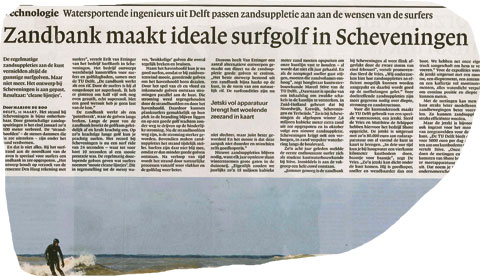An artificial reef creates great waves at Scheve-ningen Beach, heralds NRC Handelsblad. Protecting the country against flooding while still retaining good surf spots along the coast had long seemed a contradiction in terms.
Every year huge quantities of sand need to be dumped on Dutch beaches to support the dunes, which are constantly eroding. These piles of dumped sand are washed away by the sea and strengthen the dunes further along the coastline.
Surfers were never too keen about this dumping process, because shortly after the sand was dumped the waves they ride on would mostly disappear. Because of the extra sand, the beaches become steeper, and this leads to the waves breaking much more suddenly.
Nevertheless, at the moment the surfer dudes in the coastal town of Scheveningen are now breaking personal records, despite the fact that extra sand has recently been added to local beaches. Large amounts of this sand were poured on an underwater embankment, turning it into a reef that runs perpendicular to the coastline and creates a great swell. The waves start curling at the tip of the reef and continue doing so all the way to the beach. Reefs like these (but then natural reefs) are common at many of top surf spots around the world.
Coastal engineer and TU alumnus, Erik van Ettinger, of the company SurfReefs, together with PhD students, Sierd de Vries, Matthieu de Schipper and Martijn Henriques (faculty of Civil Engineering and Geosciences), designed this reef that was commissioned by the municipality. “I was there in the water myself recently”, says De Vries, who is a passionate surfer. “Talks about creating this reef started three years ago and now it’s accomplished. It’s really amazing how well it works. The waves are better now than before the sand was dumped. Normally you’re happy if you get to ride a wave for about 10 seconds. Now however we get rides of up to 24 seconds. It’s unprecedented.”
Unfortunately however this great point break is only temporary, since the sand is being washed away gradually. But instead of fearing such coastal protection measures, surfers will now be looking forward to them.
Before they could design the artificial reef, the researchers had to investigate the sedimentation processes along the coast. With a jet-ski, loaded with high tech and water-tight electronics, they surveyed the seabed for months. Using what is known as a Doppler current profiler, they measured the currents at different depths, while also using an echo sounder to make depth profiles.
“We’re now assigned to monitor the reef and investigate how much the waves have been ameliorated and how the reef could be improved”, De Vries concludes.
Je staat op nummer 21. Jou zien we waarschijnlijk niet in het parlement.
“Ik sta op een kansloze plek inderdaad. Inmiddels sta ik overigens wel op de negentiende plaats. Sommige mensen zijn van de lijst afgehaald omdat ze hun inschrijfformulieren niet op tijd hadden teruggestuurd. Maar dan nog. De peilingen laten geen enkele zetel voor ons zien.”
Dat is niet zo rooskleurig.
“Nee. Het vervelende is dat je als kleine partij nooit wordt uitgenodigd voor debatten. Er heerst wantrouwen jegens kleine nieuwe partijen.”
Hebben jullie wel voldoende campagne gevoerd?
“Ik heb begrepen dat ik een van de fanatiekste campagnevoeders ben. Ik heb flink wat posters in de regio Leiden geplakt en in mijn woonplaats Oegstgeest veel geflyerd. Ik heb het er geforceerd bij gedaan naast mijn werk en studie. Ik ben een beetje gek.”
Hoezo gek? Je wilt toch graag in het parlement terecht komen?
“Nee. Ik vecht voor een zetel voor onze partij. Zelf wil ik niet in het parlement. Ik heb nu leuk werk waar ik niet mee wil stoppen. Sinds november vorig jaar werk ik in de logistieke sector als projectmanager.”
Europese politiek spreekt mensen niet zo aan. Waar ligt dat volgens jou aan?
“Mensen vinden de Europese politiek onoverzichtelijk. En ze zijn vaak teleurgesteld in dingen die vanuit de EU op Nederland zijn afgekomen. Snelwegen die bijvoorbeeld niet mogen worden uitgebreid vanwege Europese normen voor fijnstof. Of gloeilampen die na 2011 niet meer in de winkels mogen liggen. Als ik flyers uitdeel dan zie ik de mensen denken ‘daar heb je weer zo’n rare vogel die onzin gaat verkopen’.”
Je hoort ook vaak dat het de lobbyclubs zijn die de politiek bepalen in Brussel.
“Ja dat klopt. Dat de gloeilampen verdwijnen, komt door de lobby van Phillips en Osram. Die bedrijven verdienen meer aan spaarlampen. Een andere reden waarom mensen weinig interesse tonen, is dat je na de verkiezingen nauwelijks meer iets hoort van de politici. Pas als de nieuwe verkiezingen eraan komen duiken ze weer op. Logisch dat ze opnieuw gekozen willen worden: ze verdienen schandalig veel geld.”
Dit is niet echt een verhaal waarmee je mensen naar de stemlokalen lokt.
“Het is goed om te gaan stemmen. Het is de enige manier om dingen te veranderen.”



Comments are closed.